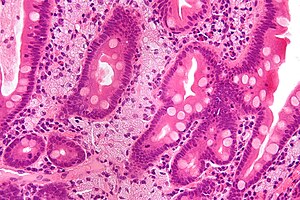Difference between revisions of "Whipple's disease"
Jump to navigation
Jump to search
(→Stains) |
Alessandro (talk | contribs) m (→General: typo) |
||
| (2 intermediate revisions by one other user not shown) | |||
| Line 34: | Line 34: | ||
==General== | ==General== | ||
Etiology: | Etiology: | ||
*Infection - caused by ''Tropheryma whipplei''<ref name=pmid11777846>{{cite journal |author=Liang Z, La Scola B, Raoult D |title=Monoclonal antibodies to immunodominant epitope of Tropheryma whipplei |journal=Clin. Diagn. Lab. Immunol. |volume=9 |issue=1 |pages=156?9 |year=2002 |month=January |pmid=11777846 |pmc=119894 |doi= |url=http://cvi.asm.org/cgi/pmidlookup?view=long&pmid=11777846}}</ref> a rod-shaped | *Infection - caused by ''Tropheryma whipplei''<ref name=pmid11777846>{{cite journal |author=Liang Z, La Scola B, Raoult D |title=Monoclonal antibodies to immunodominant epitope of Tropheryma whipplei |journal=Clin. Diagn. Lab. Immunol. |volume=9 |issue=1 |pages=156?9 |year=2002 |month=January |pmid=11777846 |pmc=119894 |doi= |url=http://cvi.asm.org/cgi/pmidlookup?view=long&pmid=11777846}}</ref> a rod-shaped organism.<ref name=pmid11764080>{{Cite journal | last1 = Alkan | first1 = S. | last2 = Beals | first2 = TF. | last3 = Schnitzer | first3 = B. | title = Primary diagnosis of whipple disease manifesting as lymphadenopathy: use of polymerase chain reaction for detection of Tropheryma whippelii. | journal = Am J Clin Pathol | volume = 116 | issue = 6 | pages = 898-904 | month = Dec | year = 2001 | doi = 10.1309/7678-E2DW-HFJ5-QYUJ | PMID = 11764080 }}</ref> | ||
Epidemiology: | Epidemiology: | ||
| Line 57: | Line 57: | ||
DDx: | DDx: | ||
*[[Mycobacterium avium complex]] (MAC). | *[[Mycobacterium avium complex]] (MAC) - not hole-y. | ||
*Crushed Brunner's glands - PAS-Alcian blue stain +ve (like Whipple's disease). | |||
===Images=== | ===Images=== | ||
| Line 84: | Line 85: | ||
==See also== | ==See also== | ||
*[[Duodenum]]. | *[[Duodenum]]. | ||
*[[Colorectal xanthomatous polyp]]. | |||
==References== | ==References== | ||
Latest revision as of 15:01, 30 May 2020
| Whipple's disease | |
|---|---|
| Diagnosis in short | |
 Whipple's disease. H&E stain. | |
|
| |
| LM | rod-shaped microorganisms - typically in macrophages; lamina propria macrophages usually abundant |
| LM DDx | mycobacterium avium complex |
| Stains | PAS +ve (microorganisms), AFB -ve |
| Site | duodenum |
|
| |
| Clinical history | usu. middle aged men |
| Signs | diarrhea |
| Prevalence | very rare |
| Prognosis | good |
| Treatment | antibiotics |
Whipple's disease is a rare infectious disease that is classically found in the duodenum.
General
Etiology:
Epidemiology:
- Very rare.
- Classically middle aged men.
Clinical
- Malabsorption (diarrhea), arthritis + others.
- Symptoms are non-specific.
Treatment:
- Antibiotics - for months and months.
Gross
- Pale yellow or white spots.[3]
Microscopic
Features:[4]
- Rod-shaped microorganisms - typically found in macrophages.
- Macrophages usually abundant - key feature that should raise Dx in DDx.
- Organisms periodic acid-Schiff (PAS) positive.
DDx:
- Mycobacterium avium complex (MAC) - not hole-y.
- Crushed Brunner's glands - PAS-Alcian blue stain +ve (like Whipple's disease).
Images
Stains
Images
See also
References
- ↑ Liang Z, La Scola B, Raoult D (January 2002). "Monoclonal antibodies to immunodominant epitope of Tropheryma whipplei". Clin. Diagn. Lab. Immunol. 9 (1): 156?9. PMC 119894. PMID 11777846. http://cvi.asm.org/cgi/pmidlookup?view=long&pmid=11777846.
- ↑ Alkan, S.; Beals, TF.; Schnitzer, B. (Dec 2001). "Primary diagnosis of whipple disease manifesting as lymphadenopathy: use of polymerase chain reaction for detection of Tropheryma whippelii.". Am J Clin Pathol 116 (6): 898-904. doi:10.1309/7678-E2DW-HFJ5-QYUJ. PMID 11764080.
- ↑ Salkic, NN.; Alibegovic, E.; Jovanovic, P. (May 2013). "Endoscopic appearance of duodenal mucosa in Whipple's disease.". Gastrointest Endosc 77 (5): 822-3; discussion 823. doi:10.1016/j.gie.2013.01.016. PMID 23490230.
- ↑ Bai J, Mazure R, Vazquez H, Niveloni S, Smecuol E, Pedreira S, Mauriño E (2004). "Whipple's disease". Clin Gastroenterol Hepatol 2 (10): 849?60. doi:10.1016/S1542-3565(04)00387-8. PMID 15476147.






